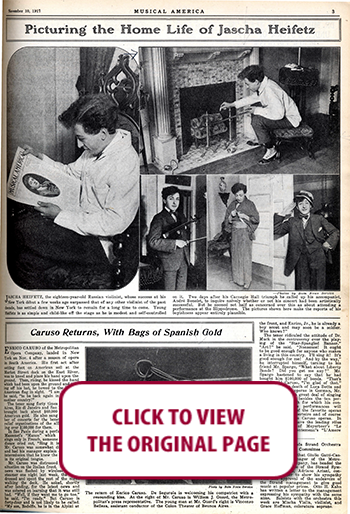 100 YEARS AGO IN MUSICAL AMERICA (214)
100 YEARS AGO IN MUSICAL AMERICA (214)
November 10, 1917
Page 3
Picturing the Home Life of Jascha Heifetz; Caruso Returns, With Bags of Spanish Gold
JASCHA HEIFETZ, the eighteen-year-old Russian violinist, whose success at his New York debut a few weeks ago surpassed that of any other violinist of the past decade, has settled down in New York to remain for a long time to come. Young Heifetz is as simple and child-like off the stage as he is modest and self-controlled on it. Two days after his Carnegie Hall triumph he called up his accompanist, André Benoist, to inquire naively whether or not his concert had been artistically successful. But he seemed not half as concerned over this as about attending a performance at the Hippodrome. The pictures shown here make the reports of his boyishness appear entirely plausible.
ENRICO CARUSO of the Metropolitan Opera Company, landed in New York on Nov. 4 after a season of opera in South America. His first act after setting foot on American soil at the Market Street dock on the East River, was to kneel and place his hand upon the ground. Then, rising, he kissed the hand which had been upon the ground and taking off his hat, he bowed to the largest American flag in sight. “I am so glad,” he said, “to be back again in my stepmother country!”
The tenor sang forty times in Buenos Aires, Rio di Janeiro and São Paulo, and brought back about $60,000 of South American gold. He also sang at a number of concerts for the benefit of war relief organizations of the allies, realizing over $100,000 for them.
In São Paulo during a performance of Maasenet’s “Manon” which the tenor sings only in French, someone in the audience cried out, “Sing it in Italian!” Mr. Caruso was somewhat disconcerted and had his manager explain during the intermission that he knew the opera only in its original tongue.
Mr. Caruso was distressed about the situation on the Italian front. When the news was flashed by wireless to the steamer one night last week, the tenor dressed and spent the rest of the night walking the deck. He asked, shortly after landing, for the latest news and was sobered on learning that it was still bad. “Well, if they want me to go too,” he said, “I’m ready.” But Caruso is forty-four and is not likely to be called. “My eon, Rodolfo, he is in the Alpini at the front, and Enrico, Jr., he is already a boy scout and may soon be a soldier. Who knows?”
The tenor ridiculed the attitude of Dr. Muck in the controversy over the playing of the “Star-Spangled Banner.” “Art?” he said. “Nonsense! It ought to be good enough for anyone who makes a living in this country. I’ll sing it! It’s good enough for me! And by the way,” he interrupted himself, turning to his friend Mr. Spargo, “What about Liberty Bonds? Did you get me any?” Mr. Spargo hastened to say that he had bought him $100,000 of bonds. “That’s good,” said Caruso, “I’m glad of that.”
Owing to the death of Luca Botta and the dropping of operas in German, Mr. Caruso will have a great deal of singing to do this winter besides the ten performances a month for which his contract calls. More performances will have to be given of the favorite operas retained in the repertoire and of course many of these are Caruso operas. In addition, he will have the leading rôles in the revivals of Meyerbeer’s “Le Prophète” and Montemezzi’s “L’Amore dei Tre Re.”




 RENT A PHOTO
RENT A PHOTO





